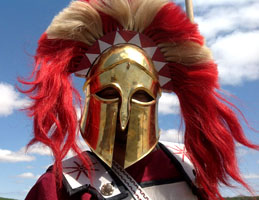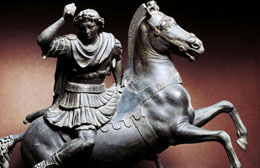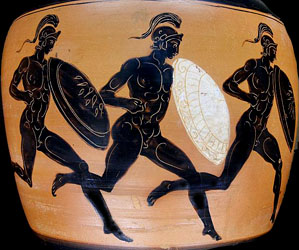There are no products listed under this category.
Shop by Category
Shop by Brand
Shop by Brand
GREEK COIN JEWELRY

 The history of Ancient Greece can be divided into three periods - the Archaic, the Classical, and the Hellenistic. The Archaic period extends from the introduction of coinage to the Greek world around 600 B.C., until the Persian Wars around 480 B.C.. During the Archaic Era, Greek society made great achievements in art, poetry and technology. It was during this period that that concept of a city-state came into being, defining ancient Greek life for hundreds of years. Prior to the establishment of city-states, early Greece was nothing more than a hodge-podge of scattered, small farming villages. These villages went on to evolve into cities, collecting taxes to support organized governments and armies. Each “polis” had a patron god or goddess that was believed to protect its citizens.
The history of Ancient Greece can be divided into three periods - the Archaic, the Classical, and the Hellenistic. The Archaic period extends from the introduction of coinage to the Greek world around 600 B.C., until the Persian Wars around 480 B.C.. During the Archaic Era, Greek society made great achievements in art, poetry and technology. It was during this period that that concept of a city-state came into being, defining ancient Greek life for hundreds of years. Prior to the establishment of city-states, early Greece was nothing more than a hodge-podge of scattered, small farming villages. These villages went on to evolve into cities, collecting taxes to support organized governments and armies. Each “polis” had a patron god or goddess that was believed to protect its citizens.
From 500 B.C. to 323 B.C., the Classical period continued, culminating with the death of Alexander the Great in 323 B.C.. The Greco-Persian wars are attributed to this time. During this era, the Persian invasion was repelled by leadership in Athens and later, the conquests of Alexander the Great would completely destroy the Achaemenid Empire, extending Greek influence all the way to Central Asia. It was during this time that Greek power and influence was at its peak. The democratic system of government under the Athenian statesman Pericles, the building of the Parthenon on the Acropolis, and the founding of the schools of philosophy of Socrates and Plato, are some examples of the Greek hallmarks of the age.
 The death of Alexander the Great marks the beginning of the Hellenistic period which continued until the emerging Roman Empire's absorption of the Greek world in the 1st century B.C.. Although Greek political independence vanished, Hellenistic society and culture remained virtually unchanged until the dawning of Christianity, under establishment of Roman rule. During the Hellenistic period, the importance of "Greece proper" declined sharply. The great centers of Hellenistic culture were Alexandria, the capital of Ptolemaic Egypt, and Antioch, the capital of Seleucid Syria.
The death of Alexander the Great marks the beginning of the Hellenistic period which continued until the emerging Roman Empire's absorption of the Greek world in the 1st century B.C.. Although Greek political independence vanished, Hellenistic society and culture remained virtually unchanged until the dawning of Christianity, under establishment of Roman rule. During the Hellenistic period, the importance of "Greece proper" declined sharply. The great centers of Hellenistic culture were Alexandria, the capital of Ptolemaic Egypt, and Antioch, the capital of Seleucid Syria.
Classical Greek culture had a powerful influence on the Roman Empire, which carried a version of it to many parts of the Mediterranean region and Europe. Because of this, Classical Greece is generally considered to have provided the  foundation for Western culture.
foundation for Western culture.
The art of ancient Greece has exercised an enormous influence on the culture of many countries from ancient times until the present, particularly in the areas of sculpture and architecture. In the West, the art of the Roman Empire was largely derived from Greek models. In the East, Alexander the Great's conquests initiated several centuries of exchange between Greek, Central Asian and Indian cultures, resulting in Greco-Buddhist art, with ramifications as far as Japan. Following the Renaissance in Europe, the humanist aesthetic and the high technical standards of Greek art inspired generations of European artists. Well into the 19th century, the classical tradition derived from Greece, dominated the art of the western world.
- TEXT AND IMAGES COPYRIGHT JOHNBMCNAMARA.COM
 US Dollars
US Dollars
 AUD
AUD
 CAD
CAD
 POUNDS STERLING
POUNDS STERLING
